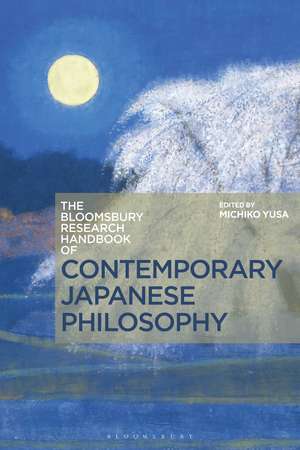The Bloomsbury Research Handbook of Contemporary Japanese Philosophy: Bloomsbury Research Handbooks in Asian Philosophy
Editat de Michiko Yusa Contribuţii de Dr Raquel Bouso Garcia, Dr Ching-yuen Cheugn, Dr Bret W. Davis, Dr Enrico Fongaro, Dr Nobuo Kazashi, Dr John W. M. Krummel, Dr Keiichi Noe, Dr Kenn Nakata Steffensenen Limba Engleză Paperback – 12 dec 2018
| Toate formatele și edițiile | Preț | Express |
|---|---|---|
| Paperback (1) | 262.54 lei 6-8 săpt. | |
| Bloomsbury Publishing – 12 dec 2018 | 262.54 lei 6-8 săpt. | |
| Hardback (1) | 821.32 lei 6-8 săpt. | |
| Bloomsbury Publishing – 20 sep 2017 | 821.32 lei 6-8 săpt. |
Preț: 262.54 lei
Preț vechi: 298.01 lei
-12% Nou
Puncte Express: 394
Preț estimativ în valută:
50.24€ • 52.45$ • 41.58£
50.24€ • 52.45$ • 41.58£
Carte tipărită la comandă
Livrare economică 04-18 aprilie
Preluare comenzi: 021 569.72.76
Specificații
ISBN-13: 9781350096950
ISBN-10: 1350096954
Pagini: 416
Dimensiuni: 156 x 234 mm
Greutate: 0.61 kg
Editura: Bloomsbury Publishing
Colecția Bloomsbury Academic
Seria Bloomsbury Research Handbooks in Asian Philosophy
Locul publicării:London, United Kingdom
ISBN-10: 1350096954
Pagini: 416
Dimensiuni: 156 x 234 mm
Greutate: 0.61 kg
Editura: Bloomsbury Publishing
Colecția Bloomsbury Academic
Seria Bloomsbury Research Handbooks in Asian Philosophy
Locul publicării:London, United Kingdom
Caracteristici
Presents critical essays by leading philosophers and scholars to the past, present and future of contemporary fields of research within Japanese philosophy
Notă biografică
Michiko Yusa is Professor of Japanese Thought and Intercultural philosophy, Department of Modern & Classical Languages & the Center for East Asian Studies, Western Washington University, USA
Cuprins
List of Abbreviation & Conventions Introduction, Michiko Yusa, Western Washington University, USA Part I: Making of Modern Japanese Philosophy: Phenomenology as a Case in Point1. Phenomenology in Japan: Its Inception and Blossoming, Keiichi Noe, Tohoku University, JapanPart II: Social and Political Themes2. Confucianism in Modern Japan, Takahiro Nakajima, The University of Tokyo, Japan3. The Political Thought of the Kyoto School: Beyond 'Questionable Footnotes' and 'Japanese-style Fascism', Kenn N. Steffensen, The University of Cork, Ireland4. Metanoetics for the Dead and the Living: Tanabe Hajime, Karaki Junzo, & Moritaki Ichiro on the Nuclear Age, Nobuo Kazashi, Kobe University, Japan5. In the Wake of 3.11 Earthquake of 2011: Philosophy of Disaster and Pilgrimage, Cheung Ching-yuen, The Chinese University of Hong Kong, Hong KongPart III: Aesthetics6. The Aesthetics of Tradition: Making the Past Present, Michele F. Marra7. Bodily-Present Activity in History-An Artistic Streak in Nishida Kitaro's Thought, Enrico Fongaro, Tohoku University, Japan 8. In Search of an Aesthetics of Emptiness: Two European Thinkers, Raquel Bouso Garcia, University of Pompeu Fabra, Barcelona, SpainPart IV: Some Prominent 20th Century Thinkers9. Watsuji Tetsuro: Accidental Buddhist? An Introduction, Steve Bein, University of Dayton, USA 10. Encounter in Emptiness: The I-Thou Relation in Nishitani Keiji's Philosophy of Zen, Bret W. Davis, Loyola University Maryland, USA11. Creative Imagination, Sensus Communis, and the Social Imaginary: Miki Kiyoshi and Nakamura Yujiro in Dialogue with the Contemporary Western Philosophy, John W. M. Krummel, Hobart and William Smith Colleges, USA12. Nishida Kitaro as a Philosopher of Science, Keiichi Noe, Tohoku University, JapanPart V: Philosophical Dialogue on Gender & Life13. Japanese and Western Feminist Philosophies: A Dialogue, Erin McCarthy, St. Lawrence University, USA14. Affirmation via Negation: Zen Philosophy of Life, Sexual Desire, and Infinite Love, Michiko Yusa, Western Washington University, USAAppendix: Two Essays by Nishida Kitaro"The Beauty of Calligraphy" "On Japanese Short Poetry, Tanka" About the authors Timeline Index of Japanese texts cited Index of names and terms
Recenzii
The collection should be considered essential reading for those working in or interested in the field of Japanese philosophy. But, nonspecialists will also find many accessible articles that engage current issues in critical theory (such as John Krummel's essay on the social imaginary) and gender studies (such as the chapter by Erin A. McCarthy on comparative feminism and the chapter by Yusa on gender and sexuality in Zen philosophy) . Overall, the collection of essays that Yusa has compiled is a rich repository of thought-provoking new work in Japanese philosophy.
[An] excellent philosophical book. I highly recommend it and hope that more readers will join our constructive discussions in the field of Japanese philosophy.
This handbook fills a void in the literature in English on contemporary philosophy in Japan, with essays on topics ranging from aesthetics to politics, phenomenology to philosophy of science, and feminism to nuclear power. Its considerable strengths are enhanced by the diversity of the contributors, some of whom are senior scholars in the field and others up-and-coming researchers, some hailing from Japan and others from various countries in the West. A first-rate introduction to this exciting new area of research.
Contemporary Japanese Philosophy is a most welcome addition to the ever-growing western literature on Japanese thought, incorporating the work of key scholars in the field. It should appeal not only to readers interested in Japan but also to those seeking fresh perspectives on many key issues of our time such as the philosophy of disaster, feminism, the body, science, and artistic creativity
The Bloomsbury Research Handbook of Contemporary Japanese Philosophy makes an especially valuable contribution in underscoring, through its essays hailing from the various corners of the globe, the international intellectual and practical phenomenon that the field of Japanese philosophy has become. The editor and contributors deserve the thanks of their colleagues in this exciting, burgeoning field as well as those of parties globally fascinated by these developments.
[An] excellent philosophical book. I highly recommend it and hope that more readers will join our constructive discussions in the field of Japanese philosophy.
This handbook fills a void in the literature in English on contemporary philosophy in Japan, with essays on topics ranging from aesthetics to politics, phenomenology to philosophy of science, and feminism to nuclear power. Its considerable strengths are enhanced by the diversity of the contributors, some of whom are senior scholars in the field and others up-and-coming researchers, some hailing from Japan and others from various countries in the West. A first-rate introduction to this exciting new area of research.
Contemporary Japanese Philosophy is a most welcome addition to the ever-growing western literature on Japanese thought, incorporating the work of key scholars in the field. It should appeal not only to readers interested in Japan but also to those seeking fresh perspectives on many key issues of our time such as the philosophy of disaster, feminism, the body, science, and artistic creativity
The Bloomsbury Research Handbook of Contemporary Japanese Philosophy makes an especially valuable contribution in underscoring, through its essays hailing from the various corners of the globe, the international intellectual and practical phenomenon that the field of Japanese philosophy has become. The editor and contributors deserve the thanks of their colleagues in this exciting, burgeoning field as well as those of parties globally fascinated by these developments.

























